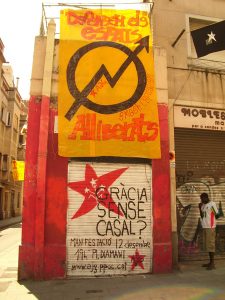 [Lietuvišką tekstą rasit apačioje]
[Lietuvišką tekstą rasit apačioje]
On Wednesday evening at “Antras Aukštas” Pizzeria 7pm there will be a discussion about opening a social centre. Everyone who feel interested in being involved opening a socially and politically active space are welcome.
Before jumping into practicalities about where to find a place and how to get it, first of all we want to address some questions that are coming from experience of having infoshop, occupations against new labor code, and critique of squatting.
To begin, the question would be: what the social centre is for?
Having a space means more possibilities to spread anti-authoritarian ideas and to have a space where to organise. However, if it is only about anti-authoritarian books and zines, political discussions and film screenings, the space tends to create only a “radical” identity for its’ own well being, not overlapping with material struggles and not creating bonds with community around. Usually, the space dies out as it stays only on few people need to sustain this identity and people with the same identity attending the events. Or in the worst case scenario, it can can lead to gentrification of neighborhood by attracting liberal “cultural milieu” (hipsters) to peripheral districts and making it “exiting”, “undiscovered” and “unique”. Depending on where you are, this can create even more separation and conflict with community around.
It doesn’t mean dismissing cultural events, parties, discussions or film screenings as wrong (even hipster might be not a lost cause). The problem is how to set up a space for organising which is not based on identity as “anarchist”, “active youth”, you name it.
It might be helpful to look at examples of social centres or squats like Rog (working with “erased” people in Slovenia), Rozbrat (a space where Syndicalist Union is based, Poznan), or Syrena (Warsaw, the building was occupied after a housing activist was killed). Also, GPB occupation might be a good example. In some way, it succeed into involving people from different backgrounds and creating bonds based not on identities. The aim of the occupation, time and materialities were limited, but it could be a good entry point for discussion about our context.
And last, we recommend to read a short critique of squatted social centres for the discusssion. For those who haven’t been involved in squatting, maybe it would resonate a bit with experience from occupation. As this is the only material for discussion, it is quiet important that everybody reads it. Following it, we will discuss different option for acquiring a space, its’ minuses and benefits.
So, in the end, the aim of discussion is to come up with an idea of what kind of space we want to create and with we come with agreement, think about next steps.
[LT]
Trečiadienio vakarą Picerijoje “antras aukštas” 7h. vyks diskusija apie naujo socialinio centro atidarymą. Visi, kas būtų susidomėję ir nori įsitraukti į politiškai ir socialiai aktyvios vietos kūrimą, yra laukiami.
Prieš šokant į praktikinius klausimus, norim pirmiausia iškelti keletą klausimų kurie kyla iš infoshopo, okupacijų ir skvotinimo patirties. Pradedant nuo klausimo: kam yra skirtas socialinis centras?
Erdvė duoda daugiau galimybių skleisti anti-autoritarines idėjas ir taip pat lengviau organizuotis. Bet jei tai reiškia tik zinus ir knygas, politines diskusijas ir filmų peržiūras, erdvė dažnai sukuria tik “radikalų” identitą, bet nėra susieta materialiais saitais su aplinkine bendruomene ar pasipriešinimu prieš išnaudojimą darbe, kovojimu už apgyvendinimą ir pan. Dažniausiai tokia erdvė lieka lankoma siauro rato žmonių, turinčių panašų identitetą. Arba dar blogiau, tai gali vesti į rajono gentrifikaciją, kultūringais renginiais pritraukiant “centro publiką” ir taip paverčiant vietą nauja “egzotine” atrakcija. Tai gali vesti netgi į konfilktą su vietine bendruomene (priklausomai, žinoma, koks tai rajonas).
Tai nereiškia kultūrinių renginių, vakarėlių atsisakymą. Klausimas yra kaip kurti erdvę organizavimuisi, kuris nebūtų grįsta vien identitu kaip “anarchistai”, “aktyvus jaunimas” ar bet kas kita.
Šioje situacijoje gali padėti kiti socialinių centrų ar skvotų pavyzdžiai: Rog (dirba su “ištrintais žmonėmis Slovėnijoje”), Rozbrat (skvotas Poznanėje, kuriame įsikūrusi syndikalistinė profsąjunga), ar Syrena (skvotas Varšuje, užimtas po aktyvistės pasisakiusios prieš žmonių iškeldinimą iš namų nužudymo).
Galiausiai, siūlom paskaityti trumpą kritiką skvotintiems socialiniams centras, kaip dar vieną aspektą šioje diskusijoje. Tiem kas nėra susidūrę su skvotinimu, galbūt šis tekstas šiek tiek rezonuos su GPB okupacijomis. Taip pat, tai yra vienintelė medžiaga diskusijai, tai svarbu, kad daugelis būtų susipažinę su juo. Sekant šį tekstą, pakalbėsim apie skirtingus būdus įkurti erdvę.
Taigi, galiausiai diskusijos tikslas yra suformuoti erdvės viziją ir jei tai pavyks, pašnekėti apie kitus žingsnius.